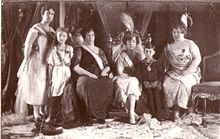Fatma Ulviye Sultan (Ottoman Turkish: فاطمه علویه سلطان, "one who abstain" and "exalted, lofty"; 11 September 1892 – 25 January 1967) was an Ottoman princess, the daughter of Sultan Mehmed VI and Nazikeda Kadın.
| Ulviye Sultan | |||||
|---|---|---|---|---|---|
 Ulviye (first from left) at Sabiha Sultan's (third from right) wedding, 29 April 1920 | |||||
| Born | 11 September 1892 Ortaköy Palace, Istanbul, Ottoman Empire Istanbul, Turkey) | ||||
| Died | 25 January 1967 (aged 74) İzmir, Turkey | ||||
| Burial | Aşiyan Asri Cemetery, Istanbul | ||||
| Spouse | |||||
| Issue | First marriage Suade Hümeyra Hanımsultan | ||||
| |||||
| Dynasty | Ottoman | ||||
| Father | Mehmed VI | ||||
| Mother | Nazikeda Kadın | ||||
| Religion | Sunni Islam | ||||
Early life
editFatma Ulviye Sultan was born on 11 September 1892 in her father's palace in Ortaköy.[1] Her father was Sultan Mehmed VI, son of Sultan Abdulmejid I and Gülistu Kadın. Her mother was Nazikeda Kadın, the daughter of Hasan Marshan and Fatma Horecan Aredba.[2] She was the second daughter born to her father and mother. She had two sisters, Münire Fenire Sultan, four years older than her and died as a newborn, and Rukiye Sabiha Sultan, two years younger than her. She had a younger half-brother, Şehzade Mehmed Ertuğrul, son of Müveddet Kadın.[3][4][5]
Refik Bey, the son of Mihrifelek Hanım, the second kalfa of Sultan Abdulmejid I, was appointed teacher to Ulviye and her younger sister Sabiha Sultan.[6] The two had learned to play the piano from Mlle Voçino.[7]
First marriage
editIn February 1916, after the death of the heir to the throne, Şehzade Yusuf Izzeddin, her father was given the title of the crown prince. By now, Ulviye had grown and reached the age of maturity. Ulviye married Ismail Hakki Pasha, son of the last grand vizier of the Ottoman Empire, Ahmed Tevfik Pasha and his Swiss wife Elisabeth Tschumi, on 10 August 1916, in a yalı in Kuruçeşme.[5][8][9] The marriage was performed by Şeyhülislam Hayri Efendi. Her dowry was fixed to 1000 gold coins.[7]
The couple settled in the yalı in Kuruçeşme. The two together had a daughter, Suade Hümeyra Hanımsultan, born on 4 June 1917.[1][5][7][8] In October 1920, her father bought two houses for his daughters in Nişantaşı. The mansions were known as the Twin Palaces. He gave one house to Ulviye Sultan and the other to Sabiha.[10] Ulviye divorced her husband on 21 June 1922.[1][5][7][8]
Second marriage
editAfter her divorce, Ulviye married Ali Haydar Bey Germiyanoğlu, son of Zülüflü Ismail Pasha, on 1 November 1923 in the Nişantaşi Palace. No issue came of this marriage.[5][7][8]
In the exile of the imperial family in March 1924, Ulviye, her husband, and her daughter settled in San Remo. After her father died in 1926, she moved to Monte Carlo, and in 1929, she relocated to Alexandria.[7]
In 1952, Ulviye Sultan and her family returned to Istanbul after the revocation of the law of exile for princesses.[7] Here, she settled in İzmir with her daughter.[8]
Death
editUlviye Sultan died on 25 January 1967 at the age of seventyfour and was buried in Aşiyan Cemetery, Istanbul.[3][1]
Her husband outlived her by three years and died in 1970.[5]
Honours
editIssue
edit| Name | Birth | Death | Notes |
|---|---|---|---|
| By Ismail Hakkı Pasha (married 10 August 1916 – divorced 21 June 1922; 20 October 1881 – 10 October 1977) | |||
| Suade Hümeyra Hanımsultan | 4 June 1917[12] | 17 May 2000[12] | Born in Istanbul; Married and had issue; Died in Kuşadası, Turkey[12] |
Ancestry
edit| Ancestors of Ulviye Sultan | |||||||||||||||||||||||||||||||||||||||||||||||||||||||||||||||||||||||||||||||||||||||||||||||||||||||||||||||||||||||||||||||||||||||||||||||||||||||||||||||||||||||||||||||||||||||||||||||||||||||||||||||||||||||||||||||||||||||||||||||||||||||||||||||||||||||||
|---|---|---|---|---|---|---|---|---|---|---|---|---|---|---|---|---|---|---|---|---|---|---|---|---|---|---|---|---|---|---|---|---|---|---|---|---|---|---|---|---|---|---|---|---|---|---|---|---|---|---|---|---|---|---|---|---|---|---|---|---|---|---|---|---|---|---|---|---|---|---|---|---|---|---|---|---|---|---|---|---|---|---|---|---|---|---|---|---|---|---|---|---|---|---|---|---|---|---|---|---|---|---|---|---|---|---|---|---|---|---|---|---|---|---|---|---|---|---|---|---|---|---|---|---|---|---|---|---|---|---|---|---|---|---|---|---|---|---|---|---|---|---|---|---|---|---|---|---|---|---|---|---|---|---|---|---|---|---|---|---|---|---|---|---|---|---|---|---|---|---|---|---|---|---|---|---|---|---|---|---|---|---|---|---|---|---|---|---|---|---|---|---|---|---|---|---|---|---|---|---|---|---|---|---|---|---|---|---|---|---|---|---|---|---|---|---|---|---|---|---|---|---|---|---|---|---|---|---|---|---|---|---|---|---|---|---|---|---|---|---|---|---|---|---|---|---|---|---|---|---|---|---|---|---|---|---|---|---|---|---|---|---|---|---|---|
| |||||||||||||||||||||||||||||||||||||||||||||||||||||||||||||||||||||||||||||||||||||||||||||||||||||||||||||||||||||||||||||||||||||||||||||||||||||||||||||||||||||||||||||||||||||||||||||||||||||||||||||||||||||||||||||||||||||||||||||||||||||||||||||||||||||||||
References
edit- ^ a b c d Bardakçı 2017, p. xviii.
- ^ Açba, Leyla (2004). Bir Çerkes prensesinin harem hatıraları. L & M. pp. 66, 77. ISBN 978-9-756-49131-7.
- ^ a b Sakaoğlu 2008, pp. 708–709.
- ^ Uluçay 2011, pp. 262, 265.
- ^ a b c d e f Adra, Jamil (2005). Genealogy of the Imperial Ottoman Family 2005. p. 35.
- ^ Bardakçı 2017, pp. 68–69.
- ^ a b c d e f g Sakaoğlu 2008, p. 709.
- ^ a b c d e Uluçay 2011, p. 265.
- ^ Bardakçı 2017, p. 11.
- ^ Bardakçı 2017, p. 31.
- ^ a b c Yılmaz Öztuna (1978). Başlangıcından zamanımıza kadar büyük Türkiye tarihi: Türkiye'nin siyasî, medenî, kültür, teşkilât ve san'at tarihi. Ötüken Yayınevi. p. 165.
- ^ a b c Bardakçı 2017, p. xiv.
Sources
edit- Bardakçı, Murat (2017). Neslishah: The Last Ottoman Princess. Oxford University Press. ISBN 978-9-774-16837-6.
- Sakaoğlu, Necdet (2008). Bu mülkün kadın sultanları: Vâlide sultanlar, hâtunlar, hasekiler, kadınefendiler, sultanefendiler. Oğlak Yayıncılık. ISBN 978-9-753-29623-6.
- Uluçay, Mustafa Çağatay (2011). Padişahların kadınları ve kızları. Ankara: Ötüken. ISBN 978-9-754-37840-5.